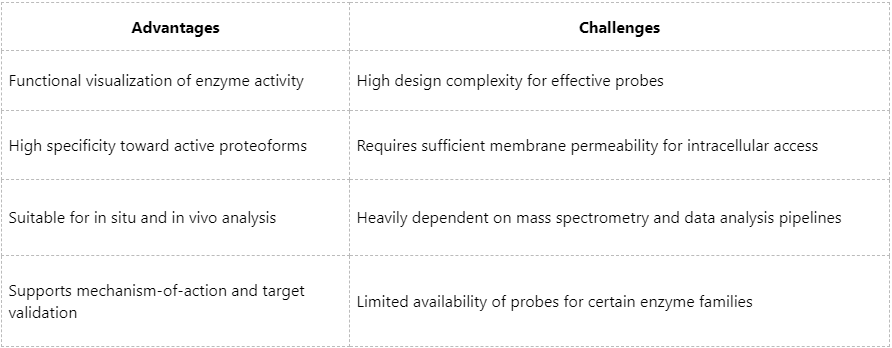Comprehensive Guide to Activity-Based Protein Profiling (ABPP): Principles and Applications
-
End-to-End Workflow: From probe development to MS-based identification and informatics.
-
High-Throughput Capacity: Enables parallel processing of multiple biological samples.
-
Broad Research Scope: Supports oncology, metabolism, immunology, neurology, infectious diseases, and more.
-
Expertise-Driven Execution: A cross-disciplinary team comprising specialists in synthetic chemistry, protein biochemistry, and mass spectrometry.
Conventional proteomic strategies such as data-dependent acquisition (DDA) and tandem mass tag (TMT) labeling focus primarily on quantifying protein expression levels, yet they often overlook the actual functional status of proteins. Activity-Based Protein Profiling (ABPP), a function-oriented proteomic technology, offers a novel approach to identifying functionally active proteins through selective labeling using chemical probes. MtoZ Biolabs is a pioneer in integrating ABPP with high-resolution mass spectrometry platforms, delivering end-to-end technical services from probe screening to target identification. This approach is particularly well-suited for enzyme target discovery, elucidation of drug mechanisms, and identification of disease-related biomarkers.
Principle of ABPP: Capturing Active Proteins via Chemical Probes
The core of ABPP lies in the use of activity-based probes (ABPs), which typically consist of three structural components:
1. Reactive Group (Warhead)
A chemically reactive moiety that forms a covalent bond with the active site of specific enzyme families. For instance, fluorophosphonate (FP) warheads are utilized for serine hydrolases, while acyloxymethyl ketone (AOMK) warheads are used for caspases.
2. Linker
A flexible structural segment connecting the warhead and tag, minimizing steric hindrance to facilitate efficient binding. It also modulates the probe’s selectivity and stability.
3. Tag
Facilitates enrichment and detection of labeled proteins. Common tags include biotin (for streptavidin-based capture), fluorescein (for gel-based detection), and alkyne/azide groups (for click chemistry labeling).
Key Advantages
1. Specificity for catalytically active proteins, thereby eliminating interference from inactive (“dead”) enzymes;
2. Compatibility with complex biological matrices including cell lysates, tissue homogenates, and live cells;
3. High scalability supporting high-throughput screening and versatile tagging strategies.
Workflow: From Sample Incubation to Target Identification
Step 1: Probe Incubation
ABPs are incubated with the sample (e.g., cell lysate, tissue homogenate, or live cells) under optimal conditions to enable selective labeling of active proteins.
Step 2: Enrichment and Elution
Labeled proteins are enriched via affinity tags (e.g., biotin-streptavidin magnetic beads) and non-specifically bound components are removed, ensuring retention of catalytically active targets.
Step 3: Proteolysis and Mass Spectrometry
Enriched proteins are enzymatically digested (e.g., using trypsin or LysC) and analyzed by liquid chromatography-tandem mass spectrometry (LC-MS/MS) to determine peptide sequences and relative abundances.
Step 4: Data Processing and Functional Annotation
Integration with UniProt, Gene Ontology (GO), and KEGG databases, along with clustering and pathway analysis, enables identification of differentially active proteins and construction of regulatory networks. MtoZ Biolabs leverages proprietary data pipelines to enhance target discovery accuracy and efficiency.
Utilizing the high-resolution Orbitrap Exploris 480 platform in conjunction with internally optimized data workflows, MtoZ Biolabs achieves high-sensitivity detection of probe-labeled proteins from sub-microgram samples.
Representative Applications
1. Enzyme Target Discovery and Drug Mechanism Elucidation
ABPP facilitates validation of small molecule inhibitors by comparing the active proteome profiles before and after compound treatment, allowing assessment of inhibitor specificity and efficacy. For example, ABPP can confirm whether certain anticancer agents selectively target serine hydrolases.
2. Biomarker Discovery of Disease-Related Enzymes
In studies of cancer, neurodegenerative disorders, and metabolic syndromes, ABPP enables identification of key active enzymes that are dysregulated under pathological conditions, revealing potential biomarkers or therapeutic targets.
3. Complementary Use with Metabolomics
Combining ABPP with metabolomic profiling elucidates the interplay between enzyme activity changes and metabolic pathway alterations, particularly valuable for studying metabolic enzyme regulation.
4. Development and Validation of Novel Probes
ABPP not only serves as an analytical platform but also supports the evaluation of newly designed probes by assessing their target engagement and selectivity.
Strengths and Limitations of ABPP

MtoZ Biolabs improves ABPP throughput and data depth by constructing high-throughput probe libraries, optimizing enrichment/washing protocols, and leveraging the Orbitrap Exploris 480 platform, offering comprehensive and personalized technical support for clients.
MtoZ Biolabs ABPP Service Highlights
Activity-Based Protein Profiling overcomes the traditional limitations of proteomics that quantify proteins without revealing their functional status. By selectively capturing catalytically active proteins, ABPP has become a cornerstone of functional proteomics. With the advent of more selective probes and advanced data analytics, ABPP is poised to expand its impact in precision medicine, target identification, and drug discovery. MtoZ Biolabs will continue to advance ABPP technologies, empowering researchers to decode protein functional networks with greater speed, accuracy, and depth.
MtoZ Biolabs, an integrated chromatography and mass spectrometry (MS) services provider.
Related Services
How to order?







